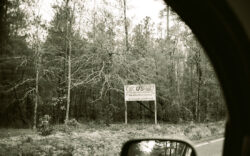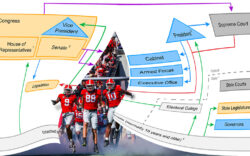This Nov. 28, 2007 Pub Notes is reprinted for its relevance to Mayor Girtz’s apology for Urban Renewal mentioned in this week’s City Dope. Some of the information here is out of date—One Athens did not solve local poverty—but the human cost of Urban Renewal, like that of many other past policies, continues. Lives were destroyed along with the neighborhoods that nurtured them, and we are still seeing the effects of displacement.
In this season of loss before the renewal of Christmas, I need to mention another fallen comrade. Augustus Caesar Harden, Jr., died suddenly on Sunday, Oct. 7 at the age of 59. Gus had polio as a child and other complications that left him pretty well crippled up, but he was as tough as he was smart, so he just kept on going. He was an avid newspaper reader and always wanted to talk about what was going on in the world. He also stayed in touch with a lot of people and knew what was happening here, too.
A lot of us first got to know Gus back in the Observer days when we’d go down to Greater Georgia Printers in Crawford, GA to “insert,” i.e. put the sections of the paper together. We did that every Wednesday night for years, and soon after we started, Gus showed up at the office, saying he had worked at the Daily News back when it was the feisty little upstart paper in town.
We did a lot of riding back and forth to Crawford in the old red Ford van, and coming back late on that dark road under the starry canopy Gus told me a lot about himself and about the Athens he grew up in. He came to embody for me a kind of living social history of another side of Athens from the one I knew.
Back during the early 1960s came a burst of federal-government funding for what was called “Urban Renewal.” The guiding principle of Urban Renewal was to bulldoze slums and blighted areas and sell them to developers who would build new, modern housing, commercial buildings and public places. This improvement went on all over the country. In Athens we tore down “substandard” housing downtown and on Baxter Hill. (You can see some of those Baxter Hill houses in 1947 silent film footage on a continuous loop in the Russell Library at UGA—unpainted wooden houses with porches in front and outhouses in back. Hamlin Simmons, who worked as a relocation officer for Urban Renewal, said some of those houses were so solid the bulldozers bounced off them. The film loop may even be a promo for Urban Renewal, since it starts out with nice, new, Five-Points-type houses and segues toward the less grand.)
The University of Georgia immediately took over Baxter Hill and began constructing the high-rise dorms that dominate that area now. The in-town Urban Renewal area had no takers and sat cleared and vacant for decades until some new stuff was eventually built along Dougherty Street, and later the Classic Center on Thomas.
The area around and below where the Classic Center is now was called “Lickskillet.” It was an intown African-American neighborhood. Gus grew up there. His father and his uncles owned homes there. Lickskillet was a stable neighborhood of homeowners. Their houses didn’t meet middle-class standards. Urban Renewal bulldozed them, and the families got little recompense. Moreover, there wasn’t much housing stock available for relocating African-American families. Some were removed to other substandard housing in East Athens; a few made it into public housing, which looked good compared to the alternatives.
Gus’s father eventually got into the projects, and Gus lived with him and took care of him as he aged. When Gus’s father finally died, Gus was back out on the street. He went through a hard period, was in and out of jail and finally secured a federally subsidized rental where he lived the rest of his life. He was one of many who were displaced by the bulldozers downtown and on Baxter Hill. Urban Renewal in Athens, with the best of intentions, had a catastrophic effect on our African-American community. Like the rest of his family and his neighbors and those on Baxter Hill, Gus became a displaced person just as surely as if his home had been bombed in a war. Urban Renewal was a forerunner of the War On Poverty, but it exacerbated poverty.
In Lickskillet and on Baxter Hill we demolished stable neighborhoods of African-American homeowners, dispersing those residents to public housing if they were lucky and to whatever was available in poorer areas if they weren’t. That was all a long time ago. Is it relevant today? Yes. Through the One Athens initiative we’re trying to deal with endemic poverty here, much of it in the African-American community, some of it traceable directly back to that period of upheaval and forced displacement. And that diaspora continues today through the “gentrification” of black neighborhoods by the incursion of upscale, student-oriented housing.
Gus Harden, crippled and racked with pain, refused to be defeated by his health or by the circumstances forced upon him. “Ain’t no use to complain,” he would say—and he didn’t. Gus Harden made the best of what he had, but he deserved better, and so do a lot of people mired in poverty here. It is fitting that the city and the university have joined together in fighting poverty and inadequate housing. We have contributed to the problem; we should contribute to the solution.
Like what you just read? Support Flagpole by making a donation today. Every dollar you give helps fund our ongoing mission to provide Athens with quality, independent journalism.










